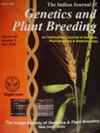Meta-QTLs linked to nitrogen use efficiency are randomly distributed in Indian rice germplasm
IF 1
4区 生物学
Q3 PLANT SCIENCES
引用次数: 0
Abstract
Nitrogen (N) recognized as a critical element for plant growth plays a fundamental role in rice cultivation. The N use efficiency (NUE) hovers around 30-35% in rice, suggesting a significant loss of N from the rice fields. Improving the NUE therefore would require genetic interventions and breeding. The cultivar improvement for N uptake and utilization is required to elevate NUE to further heights. Several quantitative trait loci (QTLs) for NUE under varying conditions and genetic backgrounds have been reported in rice. Consolidation of this distributed and unorganized information is necessary to identify critical genomic regions to be used for crop improvement. Therefore, a Meta-analysis from an assembly of 506 QTLs reported from 18 different studies was performed to identify the most significant genomic regions associated with NUE in rice. A total of 12 meta-QTLs (mQTLs) related to the traits such as NUE and grain yield per plant under N deficit conditions have been identified over four rice chromosomes namely 1, 3, 4, and 8. Evaluation of these mQTLs in a set of Indian rice germplasm revealed a significant association of the meta loci with N use parameters and showed wide distribution in the germplasm. Identification of mQTLs on different chromosomes together with their respective markers will help recruit them in marker-assisted selection (MAS) to develop N use efficient genotypes.与氮素利用效率相关的meta - qtl在印度水稻种质中随机分布
氮被认为是植物生长的关键元素,在水稻栽培中发挥着重要作用。水稻的氮利用效率(NUE)徘徊在30-35%左右,表明稻田的氮损失显著。因此,提高NUE需要基因干预和育种。品种对氮吸收和利用的改进是将NUE提高到更高水平所必需的。在不同的条件和遗传背景下,已经报道了水稻NUE的几个数量性状位点(QTL)。整合这些分散和无组织的信息对于确定用于作物改良的关键基因组区域是必要的。因此,对来自18项不同研究的506个QTL进行了荟萃分析,以确定水稻中与NUE相关的最重要的基因组区域。在缺氮条件下,在水稻的1、3、4和8条染色体上共鉴定出12个与NUE和单株产量等性状相关的间位QTL(mQTL)。在一组印度水稻种质中对这些mQTL的评估揭示了元基因座与氮利用参数的显著关联,并显示出在种质中的广泛分布。鉴定不同染色体上的mQTL及其各自的标记将有助于在标记辅助选择(MAS)中招募它们,以开发氮利用效率高的基因型。
本文章由计算机程序翻译,如有差异,请以英文原文为准。
求助全文
约1分钟内获得全文
求助全文
来源期刊

Indian Journal of Genetics and Plant Breeding
PLANT SCIENCES-
CiteScore
1.80
自引率
10.00%
发文量
0
审稿时长
6-12 weeks
期刊介绍:
Advance the cause of genetics and plant breeding and to encourage and promote study and research in these disciplines in the service of agriculture; to disseminate the knowledge of genetics and plant breeding; provide facilities for association and conference among students of genetics and plant breeding and for encouragement of close relationship between them and those in the related sciences; advocate policies in the interest of the nation in the field of genetics and plant breeding, and facilitate international cooperation in the field of genetics and plant breeding.
 求助内容:
求助内容: 应助结果提醒方式:
应助结果提醒方式:


